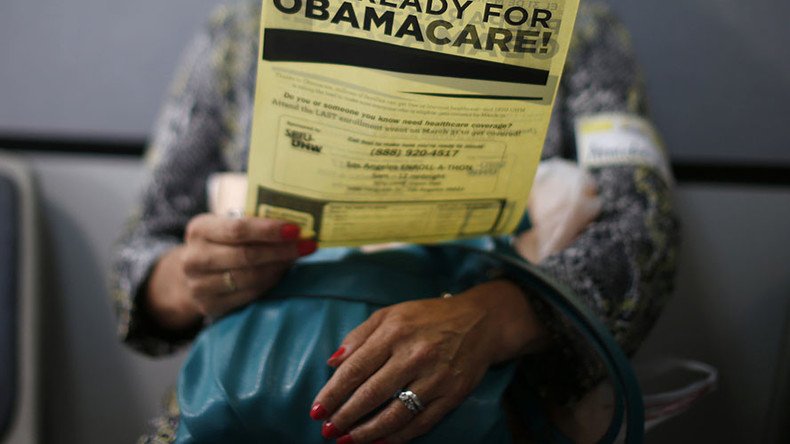Millions more Americans able to afford healthcare under Obamacare – study

New research shows that millions of Americans have been able to afford healthcare under Obamacare, particularly those with low incomes. The study’s findings come as President-elect Donald Trump and Republican leaders in Congress threaten to "repeal and replace" the plan.
Before the implementation of the Affordable Care Act in 2013, 17 percent of Americans under the age of 65 – about 45 million people – lacked health insurance, according to a new study by the Commonwealth Fund. Titled ‘A Long Way in a Short Time: State’s Progress on Health Care Coverage and Access,’ the study was made public on Wednesday.
Millions more Americans able to afford doctor's visit under Obamacare, study shows @NoamLeveyhttps://t.co/BxCbsYb6zJ
— Maloy Moore (@maloym) December 21, 2016
By 2015, 10.5 percent (28.4 million) of Americans under the age of 65 were insured, and 10.4 percent (28.1 million) were uninsured in January-June 2016.
Overall, some 17 million Americans have signed up for Obamacare.
“Between 2013 and 2015, uninsured rates for adults ages 19 to 64 declined in all states and by at least 3 percentage points in 48 dates and the District of Columbia. For children, uninsured rates declined by at least 2 percent points in 28 states,” according to the study.
#Obama touts Obamacare, financial recovery, Bin Laden's death & #IranDeal as successes of his administration https://t.co/h155vTUliLpic.twitter.com/jRWb1c6Ykv
— RT America (@RT_America) December 16, 2016
The study said people with low incomes ran the greatest risk for being uninsured. In 2013, nearly two out of five adults (38 percent) with incomes below $22,980 lacked health insurance.
By 2015, the rate had dropped to 25 percent.
Low-income adults in Kentucky, the home state of Senate Majority leader Mitch McConnell, who has vowed to repeal Obamacare, showed a 25 percent point reduction, closely followed by California, Oregon, Rhode Island and Washington.
The study found there was little progress in expanding access to dental care for adults.
The study compared affordable health care across the US between 2013 and 2015, using data from the US Census Bureau and the Behavioral Risk Factor Surveillance System.
The policy goal of the Affordable Care Act was to expand health coverage and make health care more affordable.
#Trump praises Clintons, vows to keep parts of #Obamacare in 1st post-vote TV interview https://t.co/XeSG2onRed
— RT America (@RT_America) November 12, 2016
President-elect Donald Trump and Republican leaders in Congress have pledged to repeal large parts of Obamacare early next year, citing rising health insurance premiums, among other things.
In June, research released by the Kaiser Family Foundation suggested that price increases in the ACA plans were going to be higher in 2017 than in previous years.
“Across the 14 cities we examined, the premium for the lowest-cost silver plan is increasing by a weighted average of 11 percent in 2017, though changes vary geographically ranging from a decrease of 14 percent in Providence, Rhode Island, to an increase of 26 percent in Portland, Oregon,” KFF wrote in its study.
#Obamacare premiums to increase 25 percent in 2017 – White House https://t.co/mFdoLYAesQpic.twitter.com/3iUmQFZWUV
— RT America (@RT_America) October 25, 2016
The news came as insurance companies started to announce they were pulling out people participating in exchange programs. In April, United Health Group, the largest US private health insurer said it would cancel its participation in a handful of state exchanges established by the Affordable Care Act in 2017.
That was followed in August by Aetna announcing that it would cancel its participation in health exchanges and would only stay in four states by the start of 2017. The insurance giant said it has absorbed $430 billion in pre-tax losses from the exchanges since January 2014, causing the company to reduce its participation to 242 countries from 778.
It remains unclear how Republicans intend to repeal and then replace Obamacare.
“If they take away coverage from 20 million people they will have a real problem on their hands politically,” former health insurance executive Wendell Potter told RT's Ed Schultz.
“I think what will happen is that they will convene the insurance companies, the drug companies and the hospital corporations to determine what they can tweak to say to their constituents or to Trump voters to say they have done something but what it will do is meet the needs of the special interests more than anybody else.”
Potter said the Republican discussions would likely place the insurance industry back in the driving seat in terms of healthcare, able to determine who would be eligible for coverage, dropping people from coverage and also press for contracts that provide skimpy coverage and deliver higher profit margins.
“The reality is poor people know and working people know that what the Republican Party wants to do is privatize every damn thing associated with healthcare, including Medicare,” Joe Madison, Sirius Radio host told RT’s Ed Schultz.
GOP strategist, Frank McCarthy told RT that when president-elect Donald Trump was debating Hillary Clinton, he said he planned to erase state lines and get insurance companies to compete over rates.
There is growing alarm about how the transition between policies would actual work, with many envisioning a return to overcrowded emergency waiting rooms at hospitals, cuts to hospital budgets especially as the Republicans don’t have any legislation formulated yet ready to replace Obamacare.
“This is not like this is brand a new issue. They’ve [Republicans] had hundreds of hearings on Obamacare on what the problems have been with and where the shortcomings are. They are ready and that is what they are formulating right now. What is the replacement package going to look like? You have the different segments of the Republican party who are putting that together. What are our priorities, what are the Republican study committee priorities, what are the monitor’s priorities so we can put it into one package and get 218 votes and send it over the Senate,” McCarthy told RT.












